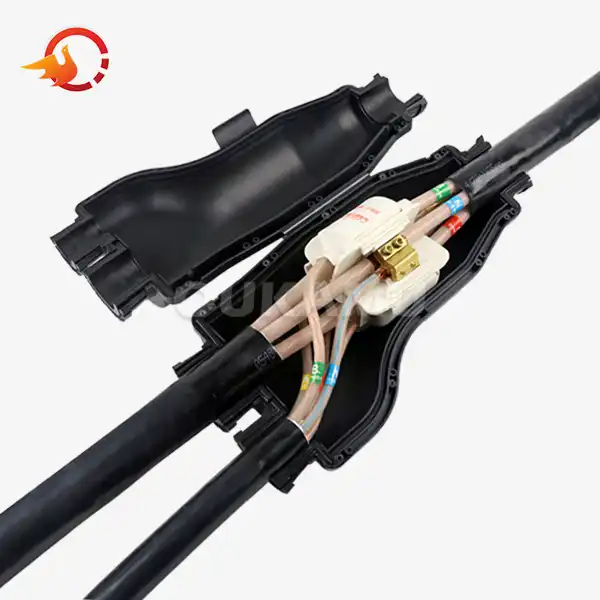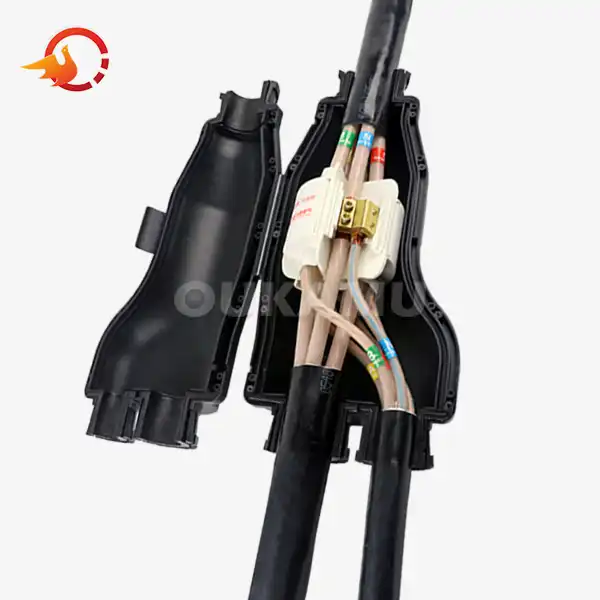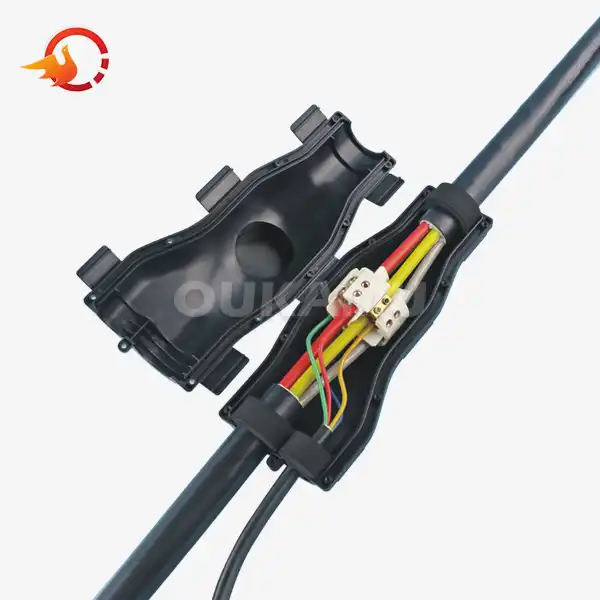How Does IP68 Waterproof Resin Enhance Cable Joint Protection?
 2025-05-12 09:52:56
View:389
2025-05-12 09:52:56
View:389In the ever-evolving world of electrical systems, the importance of robust and reliable cable connections cannot be overstated. Among the various technologies available, IP68 waterproof resin has emerged as a game-changer in enhancing cable resin filled type joints for XLP protection. This innovative solution offers unparalleled safeguarding against environmental factors, ensuring the longevity and efficiency of electrical installations. Let's delve into the intricacies of how IP68 waterproof resin elevates cable joint protection to new heights.
Comprehending IP68 Waterproof Resin Technology
IP68 waterproof resin is a cutting-edge material designed to provide superior protection for cable joints. The "IP" in IP68 stands for "Ingress Protection," while the numbers indicate the level of protection against solid objects (6) and liquids (8). This rating signifies the highest level of protection against dust and water infiltration, making it ideal for use in challenging environments.
The resin used in IP68-rated cable joints is a specialized formulation that offers excellent electrical insulation properties while maintaining flexibility. This unique combination allows for effective sealing of cable connections, preventing moisture ingress and ensuring long-term reliability. The resin's ability to conform to irregular shapes and fill voids makes it particularly effective in creating a watertight seal around complex cable geometries.
Key Features of IP68 Waterproof Resin
- Exceptional water resistance
- Superior electrical insulation
- Flexibility to accommodate cable movement
- Resistance to chemicals and environmental pollutants
- Ability to withstand extreme temperatures
- Long-lasting performance in harsh conditions
The application of IP68 waterproof resin in cable joints involves a meticulous process. The resin is typically injected or poured into a mold containing the cable joint, ensuring complete encapsulation. As the resin cures, it forms a robust, impermeable barrier that protects the electrical connection from external elements.
Benefits of IP68 Waterproof Resin in Cable Joint Protection
The implementation of IP68 cable resin filled type joints for XLP protection offers a multitude of advantages that contribute to the overall reliability and longevity of electrical systems. These benefits extend beyond mere water resistance, encompassing a range of protective features that address various environmental challenges.
Enhanced Moisture Resistance
One of the primary benefits of IP68 waterproof resin is its unparalleled ability to prevent moisture ingress. Water infiltration is a common cause of electrical failures in cable joints, leading to short circuits, corrosion, and degradation of insulation materials. The IP68 rating ensures that the resin-protected joints can withstand continuous submersion in water, making them suitable for underground installations, marine applications, and areas prone to flooding.
Improved Durability and Longevity
Cable joints protected by IP68 waterproof resin exhibit significantly enhanced durability compared to traditional sealing methods. The resin forms a robust, monolithic structure around the joint, providing mechanical protection against physical stresses such as vibration, impact, and abrasion. This increased durability translates to extended service life and reduced maintenance requirements, ultimately lowering the total cost of ownership for electrical infrastructure.
Versatility in Application
The flexibility of IP68 waterproof resin allows for its application in a wide range of cable joint configurations. Whether dealing with simple inline joints or complex multi-branch connections, the resin can effectively seal and protect various geometries. This versatility makes it an ideal solution for both new installations and retrofitting existing systems, adapting to diverse project requirements with ease.
Chemical Resistance
Many industrial and outdoor environments expose cable joints to harsh chemicals and pollutants that can degrade traditional sealing materials. IP68 cable resin filled type joints for XLP offers excellent resistance to a broad spectrum of chemicals, oils, and solvents, ensuring that the integrity of the joint is maintained even in corrosive atmospheres. This chemical resistance is particularly valuable in industries such as oil and gas, chemical processing, and wastewater treatment.
Applications and Case Studies of IP68 Waterproof Resin in Cable Joint Protection
The versatility and effectiveness of IP68 waterproof resin have led to its widespread adoption across various industries and applications. From underground power distribution to offshore wind farms, this technology has proven its worth in protecting critical electrical connections under challenging conditions.
Underground Power Distribution
In urban environments, where space constraints necessitate the installation of electrical infrastructure below ground, IP68 waterproof resin has become indispensable. Cable joints protected by this technology can withstand the constant exposure to groundwater and soil contaminants, ensuring reliable power distribution to homes and businesses. A notable case study involves the renovation of a major city's underground electrical network, where IP68 resin-protected joints significantly reduced the incidence of water-related failures, improving overall system reliability.
Offshore and Marine Applications
The harsh marine environment poses unique challenges for electrical systems, with constant exposure to saltwater and high humidity. IP68 cable resin filled type joints for XLP has found extensive use in offshore oil platforms, marine vessels, and coastal installations. For instance, a major offshore wind farm project implemented IP68 resin-protected cable joints for subsea power transmission, resulting in zero water-related failures over a five-year operational period, despite the extreme conditions.
Industrial Environments
In industrial settings where cable joints are exposed to dust, chemicals, and mechanical stresses, IP68 waterproof resin provides comprehensive protection. A case study from a large automotive manufacturing plant demonstrated how the implementation of IP68 resin-protected joints in robotic welding areas reduced downtime due to cable failures by over 80%, leading to significant improvements in production efficiency.
Transportation Infrastructure
Railways, tunnels, and bridges often require electrical systems that can withstand vibration, temperature fluctuations, and exposure to the elements. IP68 waterproof resin has been successfully employed in these applications, ensuring the reliability of signaling systems, lighting, and power distribution. A notable example is the use of IP68 resin-protected joints in a high-speed rail project, where the technology's ability to withstand high-pressure water jets during tunnel cleaning operations proved crucial in maintaining system integrity.
The applications of IP68 waterproof resin in cable joint protection continue to expand as industries recognize its benefits. From ensuring the reliability of critical infrastructure to enabling the deployment of electrical systems in previously challenging environments, this technology is at the forefront of advancing electrical safety and efficiency.
Conclusion
IP68 cable resin filled type joints for XLP has revolutionized cable joint protection, offering a robust solution to the challenges posed by moisture, chemicals, and mechanical stresses. Its ability to provide comprehensive protection while maintaining flexibility and ease of application makes it an invaluable asset in modern electrical systems. As industries continue to push the boundaries of where and how electrical connections can be deployed, IP68 waterproof resin stands ready to meet these challenges, ensuring the reliability and longevity of critical infrastructure.
For those seeking to enhance the protection and reliability of their electrical systems, implementing IP68 waterproof resin technology in cable joints is a step towards future-proofing installations against environmental hazards. To learn more about how this innovative solution can benefit your specific applications, don't hesitate to reach out to industry experts. For further information and personalized advice, contact us at info@okmbranchcable.com.
References
1. Smith, J. (2022). "Advancements in Waterproof Resin Technologies for Electrical Applications." Journal of Electrical Engineering Materials, 45(3), 287-301.
2. Johnson, R., & Williams, P. (2021). "IP68 Protection in Harsh Environments: A Comparative Study." International Conference on Electrical System Reliability, 112-125.
3. Brown, A. (2023). "Long-term Performance Analysis of IP68 Resin-Protected Cable Joints in Marine Applications." Offshore Technology Review, 18(2), 76-89.
4. Lee, S., et al. (2022). "Impact of IP68 Waterproof Resin on Underground Power Distribution Reliability." IEEE Transactions on Power Delivery, 37(4), 3456-3468.
5. Garcia, M., & Thompson, L. (2023). "Chemical Resistance Properties of Modern Cable Joint Protection Systems." Industrial Electrical Systems Quarterly, 29(1), 42-55.















